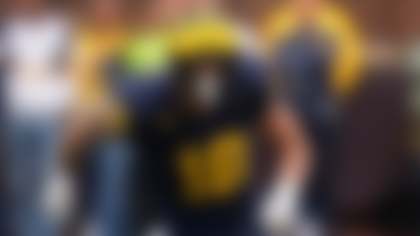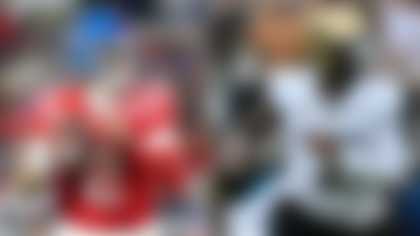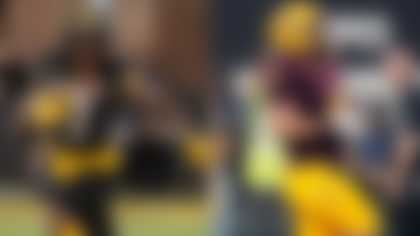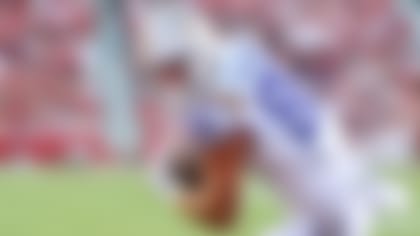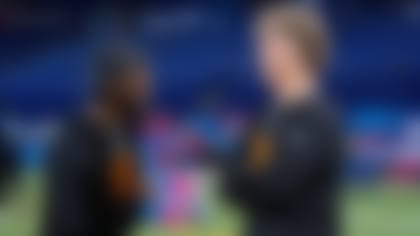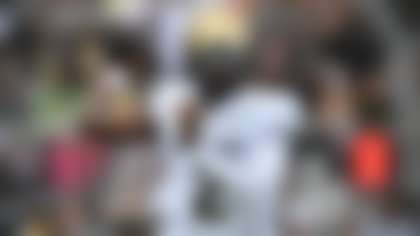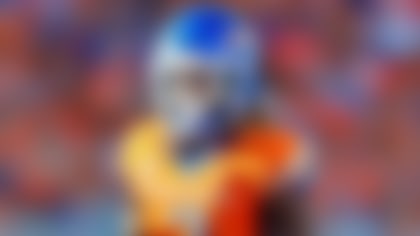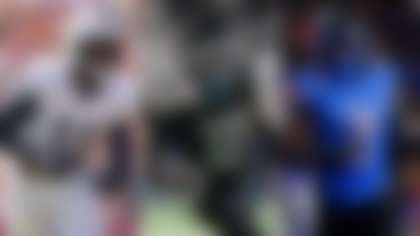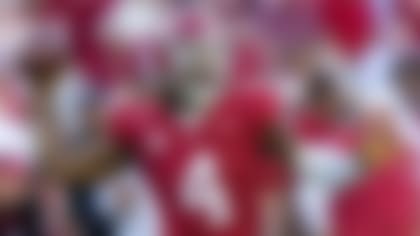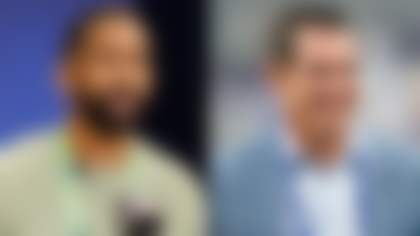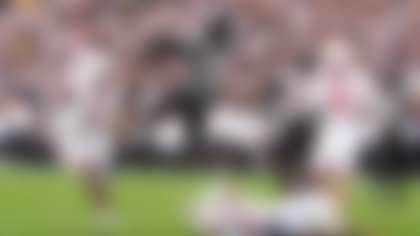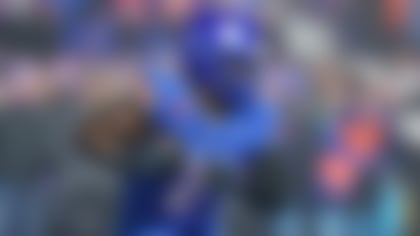WEST HOLLYWOOD, Calif. -- Journalism, for me, has always been a contact sport, and in the three-plus decades I've been pinballing around locker rooms and VIP rooms in my chosen profession, there have been moments wrought with potential peril. I've been mean-mugged by large, menacing men, from Charles Haley to Troy Aikman to Warren Sapp. I've been in dicey situations, like the imminent brawl in a seedy bar I visited on Kansas City's West Side with the late, great Derrick Thomas in the mid-1990s, before the future Hall of Fame linebacker restored order. And I've had incensed coaches vent at me in so many ways: from Mike Holmgren flipping me off from behind as I interviewed his star linebacker, to Bill Belichick throwing a coke-filled cup against a wall as I passed, to Joe Kapp, back in my college days, turning off the lights on me and a fellow Daily Cal sportswriter in the Cal football offices after we'd come to ask about the sexual assault accusations against four of his players.
Yet until a few weeks ago, I'd never had a rock n' roll icon stare me down from a couple of feet away, lean forward and tell me to "f--- off" -- then repeat the rejoinder another three times for emphasis.
Now that was surreal -- and, admittedly, one of the shining episodes of my not-so-humble existence.
After all, if you'd asked me earlier this autumn which living humans I'd most want to interview (let alone trigger with a silly joke midway through our extended and illuminating discussion), it's pretty clear to those that know me which prolific pair would be very, very high on the list.
You know Who.
When I got the unfathomable call from my boss, John Marvel, and his fellow NFL Media executive Rick Qualliotine, that I'd been assigned to interview Pete Townshend and Roger Daltrey, I nearly jumped out of my seat at an outdoor restaurant and windmilled. It was not a stretch to say that I'd been preparing to interview Townshend, the brilliant composer and inimitable guitarist, and Daltrey, the fantastic frontman and sensational singer, for my entire life.
I was born in August of 1965, less than a year after The Who began releasing singles, and thanks to some top-notch parenting, I knew every word to every song on Tommy by the time I started kindergarten. I saw them live for the first time in 1980, two years after the death of legendary drummer Keith Moon and a week after I'd finished junior high school. Two years later, at the L.A. Coliseum, they would treat 95,000 of us to one of the greatest concert experiences I'd witnessed before or since (and I've seen a lot of great ones). That show was later rivaled by their furious, emotional performance in Mountain View, Calif., in July of 2002, six days after their revered bassist, John Entwistle, dropped dead of a cocaine-induced heart attack in a Las Vegas hotel room. I was there in 2010 at the Ft. Lauderdale Convention Center for the band's press conference three days before their Super Bowl XLIV halftime performance, at the end of which Townshend and Daltrey surprised attendees by playing a gripping three-song acoustic set. My wife and I took our three kids to their first The Who show a few years back, which particularly pleased their grandpa, as my dad believes that of all the great classic rock bands of the '60s and '70s, this is the one that has most successfully "stood the test of time."
A year ago, when I paid homage to Tommy in an essay for GameDay Morning about Patrick Mahomes and Baker Mayfield, I figured it would be the closest I'd ever get to breaking down the first and greatest "rock opera" on NFL Network.
Now here I was in the tiny recording studio on the garage level of the Sunset Marquis Hotel in West Hollywood, mouth slightly agape, listening to Townshend explain how the brilliance of Jimi Hendrix served as Tommy's impetus.
The response, one of many that blew me away during our 50-minute interview, came after I'd asked a question about rivalries. We had already established the fact that neither Daltrey (a devoted Arsenal fan) nor Townshend (who essentially doesn't follow sports) knew a lick about American football; Super Bowl XLIV was the only game either has attended live, and watching on TV has no appeal. So after listing some of the NFL's storied rivalries (Packers-Bears, Steelers-Browns) and getting blank stares, and then trying to get the duo to bite on conflicts that might be more relevant to their realms (Mods vs. Rockers, Arsenal vs. Man U), I finally asked, "Do The Who have a rival?"
The answer, I figured, might be something as simple as, "Yeah, the Rolling Stones." I got much, much more than I bargained for -- and, to borrow from a Who's Next classic, I'd call that (from an interviewer's perspective) a bargain -- the best I ever had.
"We've had many, really, in a sense," Townshend said, "but it's been an unfolding ..."
Interrupted Daltrey: "You see it as (that). I've never seen it."
"Oh," Townshend continued, "I think I have. Certainly other people have seen us as a problem for them. ... It's been a whole raft of people over the years. ... For me, as a guitar player, the early rivals were Cream -- Eric Clapton. Jimi Hendrix, who came in sideways; he was on our record label for awhile. He was right in the middle of this ... he was a genius.
"But, you know, rivals shape you. They make you think. They make you sharpen up your work, you know? The Who, when Jimi Hendrix came along, were not destined for Tommy. But once we'd seen him we kind of were, because I realized we couldn't go on just relying on single songs. We had to do something epic. So I set my mind to that, and that's what we came up with."
The result: a creative endeavor that changed music, eventually became a smash hit on Broadway and, thanks to Ken Russell's 1975 film, launched Daltrey's side career as an accomplished actor. And then, just as I began to feel literal goosebumps on my arms, Townshend said something even more chilling.
"But by the time (Tommy was released in 1969) Jimi was in decline. You know, I did actually say this once -- I greatly regret I said it -- 'I will play him off the stage.' I said it to Eric (Clapton): 'I'll play Jimi Hendrix off the stage.'
"I didn't mean that I would be better than him. I meant he would die."
Hendrix, of course, would pass in September of 1970 in Notting Hill, London, after choking on his own vomit.
Townshend continued: "And so in a sense where we are today is, we're still here. We've played our own bass player and our own drummer off the stage, and we know that one of us is going to go first -- and, you know, we don't know which one."
I looked at Daltrey, his eyes open wide behind lightly tinted purple glasses. He and Townshend -- whose relationship is complicated, as the two lead very separate lives when they aren't touring together -- made eye contact for a second. And then Townshend wrapped up his thought, saying, "It's so interesting that in time your rivals do just fade away. You know, the music fades away. That's why I came up with the idea for the song (on the band's new album): All This Music Must Fade.
"It's almost as though what's really important is what we do, not the way that we feel about other people. But of course we're, what's the word, intimidated and inspired and excited and challenged by other artists. We've seen some of the greatest musicians in rock and in pop music in the 55 years we've been working, and if you look at the beginning when Roger and I started, we were in complete accord. Perhaps it took me awhile to accept how great Elvis was in the early days, but with people like the Everly Brothers and all of those guys from that period, incredible, incredible music ... and then with the British Wave happening at the same time as an American Wave, which brought Crosby, Stills and Nash and the Beach Boys and all kinds of artists from that period. ... We were doing shows in the '60s with all these amazing artists, so it wasn't like we looked at them as people that we were up against. We felt we were in a flow of energy, but we were very aware that some of them were selling records in bucket loads, and occasionally we weren't."
Daltrey has called the band's new record, titled Who, its best since 1973's Quadrophenia. That obviously caught my attention, but I was even more fascinated with the writing process that spawned it. At the start of the interview I'd asked Townshend, the songwriter, to share his impetus and inspiration for the new songs.
"Oh God, I don't want to give a lecture," he said. "What you need in order to write music for a proposition as complex and as long-standing as The Who is a lot of time, so I took a year out -- we could have carried on touring, we were doing really well -- and I spent three months kind of just clearing my brain. And then I had to make a decision whether I was going to work on a solo project or try and do something. ... I won't say for The Who, but for Roger's voice."
Townshend, after writing dozens of songs, spent months in his home studio preparing demos that he sent to Daltrey, then waited for the singer's response.
"Once he writes them and he does the backing tracks," Daltrey said, "I'd stick the vocals on -- and he gives me a great deal of freedom to adjust and move things around, especially on this record. Because when I heard the demos, which incidentally were fantastic, what I felt listening to it as me, Roger Daltrey -- I felt that it was a great Pete Townshend solo album, and how do I improve on this, and how do I climb into this and turn it into a Who album? Cause it's not just a matter of us two playing together. It's a matter of putting the music up so that it makes you feel something. Otherwise, if I'm not singing from my heart, it's going to go nowhere. He gave me a great deal of freedom and I just managed to find the route in, so here it is."
Said Townshend: "I think Roger is a great actor and interpreter and I think he needs to be given really good material. So my pitch really to myself was, 'Forget what you feel, Pete. Forget what you want to say. Just try to write something that both you, Pete, and Roger can stand beside and agree on -- and that's a pretty difficult pitch. It's not that we support different football teams. He supports Arsenal and I support nobody."
At least Townshend, who grew up occasionally attending games hosted by a couple of lower-division sides (Queens Park Rangers and Brentford) near his West London home, knows the basics of English football. When it comes to the American version, he and Daltrey require remedial education.
This was driven home during the interview when I threw out a football-analogy premise: Townshend is the primary songwriter while Daltrey, in all his microphone-swinging splendor, handles the bulk of the vocals and has the presence of a quintessential frontman. Given that, which one of them -- if The Who were a football team -- is the quarterback?
"I don't even know what that means," Townshend said, looking at Daltrey for help.
"Yeah," Daltrey said. "What is a quarterback?"
My answer: "The quarterback is the guy who takes the ball on every play on offense and either throws it or hands it to someone or runs it himself."
"I'm the quarterback," Townshend said, provoking a dubious look from Daltrey as he continued: "The interesting thing about The Who shows is that if Roger has a bad day, we all have a bad day. When I'm playing the guitar I'm looking down a lot of the time. I'm making sure that my fingers go in the right place. I can even completely ignore the audience if I want to and still do my job. I know it's better to look at them and speak to them sometimes, but I don't need to. Roger's engagement is absolutely with the audience. He's the front guy. He's the guy taking the ball to the crowd. I'm the quarterback."
Townshend's bandmate waited patiently for him to finish.
"I'm the ball," Daltrey said confidently.
The one American football game that the rockers attended, nearly a decade ago in South Florida, featured a pair of future first-ballot Hall of Fame quarterbacks in Drew Brees and Peyton Manning. When I asked what Daltrey remembered about Super Bowl XLIV, his recall was surprisingly good: "I remember the Saints were down at halftime and I thought it was our music that gave them a kick, but they came back to win it -- which was brilliant, because they hadn't won it for a very long time."
Ever, I corrected him.
"Yeah, it was a fantastic moment, and it was one year or two years after Katrina?"
Three-plus, but who's counting?
"They really needed that win and it was great."
Townshend's recollection: "I didn't watch the game. I just worried about my makeup and what to wear. When they say you're going to go and be seen by 80 million people, you worry a lot about what you're going to look like on the camera, I can assure you of that. And every artist that has ever done it, if they told you that they're interested in a football game, they're lying. They're doing their makeup and they're looking in the mirror going, 'How am I going to look in front of 80 million people?' "
Since Townshend brought it up, I mentioned the fact that Townshend's partially unbuttoned shirt had caused a bit of a stir in the immediate aftermath of the halftime set.
"Oh, really?" Daltrey said, playfully. "They saw your breasts, Pete?"
Actually, it was the sight of Townshend's stomach that provoked some unrest on social media, with many younger observers complaining that the league was catering to the wrong demographic. Coincidental or not, The Who's performance ended a run of classic-rock acts that had landed the halftime gig throughout the previous decade, a list that included The Rolling Stones, Paul McCartney, Bruce Springsteen and the E Street Band and Tom Petty and the Heartbreakers.
As for The Who's actual set? It featured shortened versions of five songs: Who's Next anthems Baba O'Riley and Won't Get Fooled Again; Tommy classics Pinball Wizard and See Me, Feel Me; and Who Are You, the title track of their popular 1978 album.
Daltrey, who in the wake of the performance publicly questioned the decision to cram so many songs into their 12-minute window, conceded in our interview that he was the one who made the call.
"Pete doesn't like medleys," Daltrey said.
Replied Townshend: "No, I don't mind medleys at all. The only thing I don't like about medleys is that you have to learn them. (Normally) you go into blind mode and you play the song that you've played a hundred times, and so on a medley you have to keep your brain alive."
It was also important to Townshend that viewers, as well as those in attendance, understand that they were seeing him play live -- something which is not always the case in such settings.
"I played live," he said, "and in order to demonstrate that I was playing live -- because the rest of the band didn't -- I made the most spectacular bum note in one of the songs. (Townshend believes it occurred in Won't Get Fooled Again.) I just kind of (raised my arm and brought it down haphazardly) and went bang. And it turned out that it wasn't a bum note. I have watched it to seem the bum note, and it's beautiful. And since then I've been experimenting in every show, often in Love Reign O'er Me where it's a really important solo. I just hit whichever note my finger decides to hit ... and it's sort of -- there are no bum notes, really."
All in all, both men regarded the experience as a positive one. Two-and-a-half years later, at the London Summer Olympics, they played the closing ceremonies on their home turf.
"I'm really glad to be able to connect with American football fans because I know that a lot of them are fans of ours," Townshend said. "There are a few teams in the USA that use our songs for the walk-on, and they've stuck with them. And we know a lot of people that are involved in the football business, and many of them are great patrons of our charities. So we stay close to them and we respect what they do, and it's great to be able to speak to that audience."
As for the knowledge that some of his anthems are being blasted at NFL stadiums -- well, Townshend isn't mad about that.
"Yeah, it makes me excited," he said. "It sort of fits in a way ... Baba O'Riley ("out here in the fields/I fight for my meals") ... also Won't Get Fooled Again. This is a thing about, we're going to have another go ... we're going to try and get it right this time."
Said Daltrey: "The Who's music is great music to fight to. That's what most sport is. It's a battle between two teams. (Our music's) not rock n' roll. We left the 'roll' out. We just did the 'rock.' "
This is a band, after all, which in its early days famously punctuated live performances by smashing instruments. Throw in Townshend's stage leaps and windmills and Daltrey's prancing and microphone maneuvering, and it's undeniable that The Who's production value -- and attitude -- has always matched the ferocity of its music. Yet when I broached that subject in a couple of questions, it got nowhere with Townshend. Eventually, as we spoke about the extensive charity efforts spearheaded by Daltrey (who co-founded Teen Cancer America) and Townshend (who since the mid-'80s has run the Double O charity that the band launched in 1976), I learned that it's a bit of a sore subject.
The charity discussion began with a bit of levity, as Townshend detailed Double O's origins: "It was formed to look after the proceeds of a concert that we did for a woman called Erin Pizzey, who was the (family care activist) that started the very first women's refuge from domestic violence. And the story is funny, but also very poignant. We were recording Quadrophenia and I got this phone call from a glamorous English actress, Joanna Lumley, and she said, 'Pete, I'm in Chiswick, and I need help.' And I said, 'With what? I'm in the middle of recording an album.' We were really busy.
"And she said, 'Well, I'm at this place and I need somebody to come and help me help them.' And I said, 'I can't come.' And Keith (Moon) said, 'Who are you talking to?' and I said, 'I'm talking to Joanna Lumley.' And he went, 'I'll go.' He wanted to shag her. So he runs off. He's gone all afternoon. Roger and I were doing vocals; I think it was Love Reign O'er Me, funnily enough. And it got to be about eight o'clock. Roger had finished and gone, and I was left with the engineer Ron Nevison. And Keith Moon rolls in, and he's different. I said, 'What's up?' and he started to cry, and he said, 'I've just been to this place ...'
"And we were teasing him, saying, 'Oh, so you didn't get in her pants, then?' We were kids, you know? And he said, 'No, we have to do something to help this woman,' and I went to meet her subsequently, and we did (a concert)."
My follow-up: "Just so I have this right -- you guys were recording one of the greatest songs of all time, and your legendary drummer went to try to hook up with an English actress ... and that's how this great charitable endeavor was born?"
Both men nodded.
Alrighty then ...
Daltrey proceeded to explain that "it was a time when we were going through a really bad period in England as far as tax was concerned." Putting money toward charitable endeavors, he said, seemed preferable to giving it away to the government.
"I'm not sure that I got the tax thing, to be honest," Townshend said. "What's interesting is that at that time we were really used to having absolutely no money -- all of us. We just had no money."
And that was the moment when I decided to make a pithy joke: Is that because you smashed the instruments all the time?
"Oh, f--- off," Townshend shot back, waving his right hand at me. "F--- off. F--- off. Seriously, f--- off."
And in that bizarre yet magical moment, as I digested the measure of his displeasure, I thought: It's a good thing he threw in the 'seriously,' because I wasn't sure he meant it the first three times.
It helped that Daltrey, as Townshend vented, flashed me a friendly smile, mouthing something I couldn't understand, but giving out a distinct vibe of, Eh, don't worry about Old Grumpy. He gets like that sometimes.
"No, the smashing of instruments, it was, you know -- what does a guitar cost? A hundred dollars back in those days?" Townshend, visibly peeved, continued. "And in any case, I paid for it. I was the songwriter. I paid for my guitars; I didn't get any free. It's not the point, you know -- you're talking about a charity thing here. We didn't make any money. There's a whole other story here, and Roger's probably best to tell this, but our managers were taking all the money."
Townshend was still pissed at me, but it didn't last. Possibly, I exuded such an unruffled sense of serenity while being upbraided by one of my idols -- and on some level, I didn't disagree with him -- that he decided that this relative 'kid' was alright, after all. In any case, he had a point to make about the impetus for the charity, and by the time he was done I felt that we'd reconnected.
"Now the charity thing came from the fact that as a band, you know, I really do think we cared about our neighborhood," he said. "We all came from the same neighborhood, and we were all very different -- but the one thing that tied us together was the neighborhood and the fact that we started in West London. We weren't 'mods' but our audience were and it was very much a neighborhood thing.
"It was very important that Erin Pizzey's was the first women's refuge in the world, and it came from Chiswick. This is where (Roger) lived, you know, and it's where my grandparents lived, just around the corner from his mom and dad -- and where John Entwistle lived just around the corner from Roger. So it was our neighborhood, and once you get a taste of that it inspires you."
Now that we were friends again, I decided to ask about something that has always fascinated me: The decision by Townshend and Daltrey to go through with a U.S. tour just after Entwistle's death in 2002. (At the time, I'd argued for a postponement -- loudly, over pints, in a Berkeley bar -- with Counting Crows frontman Adam Duritz, a fellow Cal alum with whom I had become friends after college, and whose band was serving as the tour's opening act. Finally, an exasperated Duritz had declared, "All I'm saying is it doesn't really matter what you think, because after you see them play, you're going to get down on your knees and give thanks that they decided to keep playing -- cause they sound so f------ amazing right now." He wasn't wrong -- and when my wife and I reached the entrance to the Crows' backstage area at Shoreline Amphitheater after The Who's set, Duritz was standing there to greet us with a massive 'I told you so' grin, and all I could offer was, "I'm an idiot.")
"Roger was really shaken," Townshend recalled. "I was really shaken, but I did have the advantage of having a couple of people around me that helped me. My now-wife Rachel was there with me when I got the news, but also the actor Johnny Cusack was around at that time -- we were just having lunch and got the news. And it became quite an easy decision to make. We could have done various things, but it became easy because the tour was about to start. So all we thought about was the families of the crew, and the people that have bought tickets -- and we know that when somebody buys a ticket, it's not just about a ticket. They often travel huge distances; they buy airfares; they arranged for their kids and their dogs to be looked after.
"We did have to bite back. I don't know whether either of us really wanted to do it, but we knew we had to."
It helped that Welsh bassist Pino Palladino, who'd previously played on a Townshend solo tour, was in the U.S. at the time and agreed to step in; the band had already enlisted drummer Zak Starkey, son of Ringo, to fill Moon's old role. As they regrouped and pushed through four days of rehearsals before beginning the tour in L.A. (having canceled the Las Vegas show originally intended to have been the opening gig), Townshend and Daltrey went through a gamut of emotions.
"John was a friend -- he felt like family -- and we'd watched him just start to kind of crumble in front of us," Townshend said. "It was so hard to watch. We knew he had a heart condition. We knew, too, that he was still drinking, still spending money like a rock star -- that he wasn't earning -- and it was tough. And so we weren't that surprised, but the timing of it just blew us away. And you get angry with people when they die at dodgy times."
Daltrey laughed and interjected: "One day before the first show. It's a bit much. I mean, bass players -- all the same, aren't they? ... How inconsiderate!"
Musically, Townshend felt ... well, a bit liberated.
"He lost his edge toward the end," Townshend said of Entwistle, "and he also lost his hearing. And that meant that his sound -- which was built around this incredibly rich, high, harmonic (tone) -- it wasn't necessarily that it got louder ... it was always loud ... but it got so full. It was like going and watching somebody like Albert Schweitzer play the grand organ in the Vienna Opera House, and there's not a space for anything else.
"So when he passed away, and he wasn't there on the stage, the one thing that I realized was 'Hey, I've got my job back. I can play a few notes ...' "
Added Daltrey: "We couldn't hear each other (during Entwistle's final years)."
On a personal level, however, Townshend was shaken by Entwistle's death -- and said he still misses his old friend, sometimes mimicking a finger-on-nose gesture and accompanying "ffffff" sound the bassist would make when he "couldn't think of something to say. ... So occasionally I tell that joke and I kind of go 'ffffff' and I get this wave of sadness. He was so fun to be around."
Townshend continued: "John was the first musician I ever played with. He was a trumpet player, and we had a Dixieland Jazz band. I played the banjo and he played the trumpet; we had a drummer and a clarinet player who couldn't play a note. He was the first proper musician that I played with and he was always a great ally of mine. He was the one who introduced me to Roger's band, got me that job, and obviously that went on to become what it is.
"But he was also a great supporter. There was an incident that happened when I was at school, where I got into a fight -- which is the only fight I've ever won. And the guy I'd beaten in the fight was humiliated and spread a story that I'd hit him with a brick, and I hadn't. But he told the story, and everybody sent me to Coventry (an English idiom for deliberately ostracizing someone). And the one guy who stood by me through all that was John Entwistle. It was tricky, cause I'd always stretched the truth as a young kid. I got used to being popular from telling stories, and so, I become a storyteller. It was very difficult for me to grasp the facts, so I understood that people believed him and not me. Funnily enough, this guy that I was in a fight with, we met years later and we made up ... this guy (had been) a good friend of mine, and he was a drummer in a band."
The Who's current drummer, Starkey, grew up around his father -- and obviously got to hang with The Beatles' drummer's famous friends, including Moon, whose aggressive style he clearly emulates. Starkey initially worked with Entwistle on a side project, then attracted Daltrey's attention before a solo tour in 1994. "Zak just seemed to have that kind of crazy (Keith) Moon quality that I personally like in Pete's music," Daltrey said. "I understand why some people would say, you know, 'He's a sloppy drummer,' but I kind of like that."
Said Townshend: "I don't think he's sloppy. If I have any reservations around Zak, and he and I have discussed it, it's simply that when he plays Who music he does exactly what my brother (Simon, who tours with the band as a rhythm guitarist) does. He plays the records. Because he was eight years old -- and they're roughly around the same age -- and they just grew up with The Who music (on vinyl).
"Often, Simon will come across the stage to me and say, 'Pete, you're playing the wrong chord.' And I'm like, 'Listen -- I can play what I like.' And he goes, 'No, you're actually playing this wrong.' "
By that point, with all of us laughing, and with the interview's anticipated length already having been far surpassed, I decided to wrap things up with some football-related schtick. I asked the duo if I could pitch a rock opera based on the NFL's greatest champion, a late-round draft pick who began as a fourth-stringer, survived a couple of cheating scandals and is adored by millions and millions for his charisma.
"His name is Tommy," I said. "Brady."
Without missing a beat, Townshend shot back, "Pitch it to Billy Joel."
I literally laughed out loud, so much so that I felt compelled to cover my mouth; Daltrey, his legs propped up on the loveseat with the rest of his body, cracked up, too. Perhaps Townshend was merely trying to get in a dig at an old rival, perceived or otherwise, but it didn't seem particularly charged. Rather, I took his response as a playful affirmation of one principle he and Daltrey, for all their disagreements, both seem to hold dear: There's no point in being overly beholden to the past.
In the fall of 1965, when I was an infant, the world was jolted by Daltrey's haunting growl of Townshend's radical proclamation: "Hope I die before I get old." Fifty-four years have passed since My Generation hit the airwaves. Daltrey is 75; Townshend a year younger. They've played two of their band members off the stage, and they're promoting a new album. More than half a century after its unveiling, that generational call to action, by definition, no longer stands.
The Who's recently concluded tour featured a full orchestra, with songs from the new album sprinkled into the mostly familiar set list, and the greatest rock anthem of all stripped down to its essence.
"It's only recently that Roger admitted that he wasn't crazy anymore about singing Won't Get Fooled Again," Townshend revealed.
Said Daltrey: "I love singing it the way we're doing it now. We're doing it acoustically, and I love it. Because when we recorded that in the '70s, we were experimenting with having stuff on tape, because we didn't want to add other musicians. And it just felt locked in all the time, because you couldn't move away from what the tape was doing. But now we do it acoustically, and I love it again, because I love the actual song. It's just that I got bored of doing it the same way. I like doing the acoustic stuff, because it's always loose. And it always train-crashes, but people remember the train crashes far more than when you get it perfect."
For what it's worth, the same applies to on-camera interviews. From my perspective, being cussed out by a genius whose work I've been devouring all my life makes for much better television than getting answers which sound scripted. And as a writer, albeit one whose work is far less ambitious than Townshend's, I've come to understand that eras pass and circumstances evolve -- and I appreciate that these two men with very different personalities but with a collectively rich creative history are still striving for authenticity in their golden years.
"What we're doing now on the road with an orchestra -- I know a lot of Who fans, hard Who fans, find it difficult to relate to," Townshend said. "They love it when they come see it, but they can't wait to get back to the chaos ... they're looking back at who we used to be. And remember, there were four of us, and we were exceptional and badly matched and very, very experimental and that synergy created something that was often quite dark but also mischievously humorous as well. So it's very difficult for just Roger and I to reinvent that without looking phony."
In the '60s, they smashed guitars and drum kits; in 2019, these two old rockers are hell-bent on destroying an archetype they long ago abandoned, unafraid that it might be perceived as a train crash. And if you don't like it? Well, I'm pretty sure we know what Pete would say to that.
Follow Michael Silver on Twitter @MikeSilver.

